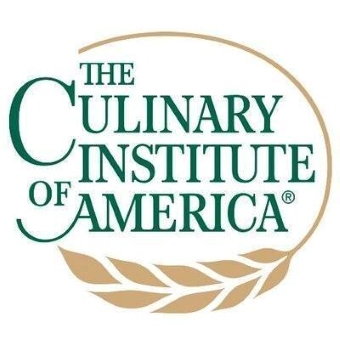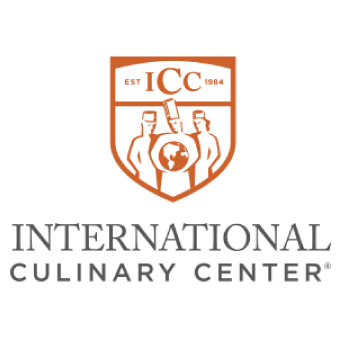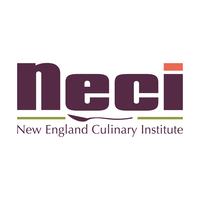Food service and hospitality are some of the fastest-growing career opportunities in America. In 2018, roughly 139,000 chefs and head cooks were employed nationwide, according to the U.S. Bureau of Labor Statistics. That number is expected to climb by approximately 15,400, marking a growth rate of about 11% – significantly faster than the average growth in other career fields.
The same research indicates that in most cases, the entry-level education required for an individual entering the food service field is a high school diploma or equivalent. Generally speaking, a college education isn’t required to begin working in food service — many successful chefs got their foot in the door as a dishwasher or cook at a local restaurant. It’s possible to work your way up through the ranks in commercial kitchens as you learn the fundamentals and progressively build your knowledge of food preparation, ingredients, and flavor profiles. The hands-on training gained from working from the ground up can be invaluable to a culinary arts career.
That said, there are many more successful chefs who have completed an accredited culinary arts program before beginning their careers. Culinary arts schools provide hands-on, immersive learning to help students learn, understand, retain, and apply the necessary skills. Attending culinary school is also an excellent way to discover employment opportunities and demonstrate to potential employers that you’re a professional who takes their work seriously. Students enrolled in a culinary arts degree program show their commitment to the effort required to be a successful chef after graduation.
Regardless of how you choose to pursue your culinary career, being involved in the preparation and distribution of food is key to developing the skills needed for success. If you’re passionate about good food and hospitality, a career in food service may be an excellent path to pursue.
Types of Culinary and Chef Degrees
There are many types of culinary and chef degrees from a wide variety of educational institutions. Students can elect to study culinary arts in general or earn a degree in a specialty field. Associate’s degrees require the least amount of time and financial investment, while bachelor’s and master’s programs are costlier, but provide a more well-rounded culinary education. Students can earn an associate’s degree and begin working while building on their education and pursuing advanced degrees. Many students choose to take this route to maintain an income and gain additional experience while they complete their education, however, others find it difficult to devote their time and energy to both studies and work.
Culinary Arts Associate’s Degree Programs
Associate’s degree programs are a great start for students ready to learn the fundamentals of cooking and progressively expand their understanding of ingredients, food service preparation, and the development of different types of flavor profiles. Depending on the program chosen and what it offers, students may have the opportunity to put what they’ve learned into practice during a food service internship before graduating.
Baking and Pastry Arts
Baking is a subset of the culinary arts that is quite different from cooking. It allows students to transform simple ingredients into works of delicious art, including pastries, artisan bread, multi-tier cakes, and plated desserts. Students learn to work with a variety of doughs, batters, and icings to create confections that taste as good as they look.
Culinary Arts
A basic culinary arts degree is an excellent start for students who know they want to go into food service but aren’t quite sure where they fit in best. Quality culinary arts degree programs help students learn how to prepare both classic and contemporary dishes, develop robust menus, and study international cuisines. Additionally, a business component is crucial — an associate’s degree in culinary arts should also prepare students with good organizational skills, maintaining equipment and cleanliness standards, and knowledge of staff management.
Culinary Arts Bachelor’s Degree Programs
A bachelor’s degree in culinary arts helps students expand their knowledge of food preparation and service to the next level. A must for anyone who wants to become a chef, or would-be restaurateurs, a bachelor’s degree offers additional education and training in global cooking techniques and cuisines, the creation of innovative dishes with unique flavor profiles, the development of food service and management skills, and more. Students will begin to understand the psychology and cultural importance of food and how to influence how food is perceived and understood by humans.
Applied Food Studies
Farm-to-table fare has gained a lot of traction in recent years, making it more important than ever for culinary students to learn where food comes from, how food is grown, and how U.S. and foreign policies impact the quality and availability of different foods. Degree programs in food studies from a culinary institute prepare students with the knowledge of food systems and how they work, agricultural sustainability, and food policy advocacy. Students with a bachelor’s degree in Applied Food Studies can work as a culinary teacher, nonprofit director, food media professional, or an advocate for food policy.
Culinary Science
A bachelor’s degree program in culinary science may be an excellent choice for students that want to go beyond traditional food service training and have a desire to influence how food is understood and used in the future. Topics generally explored in a culinary science educational program include the biology and chemistry of food, how food impacts the senses, and how to use the scientific method to answer questions about what takes place in the kitchen. Students who graduate from culinary science degree programs can work in niche food service fields like product development and restaurant research.
Food Business Management
Students who wish to become a chef or restaurateurs need to have robust leadership and business management skills in addition to their passion for the culinary arts, particularly if there’s a desire to start their own restaurant versus managing an existing one. Graduating from a culinary institute with a degree in food business management can help you gain the necessary expertise to build and operate a successful restaurant or other food service business. Whether you want to open a franchise, start your own restaurant, or manage an existing food service establishment, understanding the nuances of food business management is a must.
Hospitality Management
Hospitality continues to be a fast-growing industry worldwide, and there are an abundance of opportunities for culinary artists at high-end hotels, resorts, and other tourist attractions and destination locations. A bachelor of science in Hospitality Management can provide you with a strong foundation on which you can build superb culinary, social engagement, and service skills.
Culinary Arts Master’s Degree Programs
For students who have completed their bachelor’s degree and wish to continue to build upon their education, a master’s degree is the next step. By expanding your knowledge of the culinary arts, as well as the business side of the food service industry, you can increase the number of professional opportunities available to you.
Master’s in Food Business
The food service industry continues to grow exponentially, with no signs of slowing down. The climate is right for new, innovative culinary artists to step onto the scene — but there’s little time to make mistakes. Students who want to hone their abilities as a chef and be as prepared as possible to launch their own restaurant or other food business can earn a master’s degree that will help them build upon already-established skills.
Master’s in Wine Management
Many culinary artists enter the foray of high-end beverages — wine, in particular. How the flavors of various wines pair with different foods can create an exceptional culinary experience for the consumer. A large percentage of restaurant profits can be attributed to wine and other high-end alcoholic and non-alcoholic beverages, making it one of the fastest-growing sub-sectors of the food service industry.
A master’s degree in Wine Management not only gives you a basic understanding of how wine grapes are grown, crushed, and fermented, but also how to identify various properties of wine and how to pair them with foods for the most flavorful experience.
Why Attend Culinary School?
You know that it’s possible to get into the food service industry without a degree and work your way up to the position that you want. Why then, should you invest in the cost of attending culinary school? Working your way up the ladder takes time, and often doesn’t afford you the income you need while you’re waiting to get where you want to be. There’s also no guarantee that you’ll be able to secure the kind of opportunities you want with the work experience you have.
By obtaining a formal education in the culinary arts, however, you can ensure that you have a wealth of career opportunities available to you. You’ll learn the skills you need for success in the food service and hospitality industry, like critical thinking, nutrition, food preparation and design, business management, and customer service. Your education will prepare you for the position you desire, instead of working a job you don’t want so you can someday have the opportunity to work the one that you do.
How Do You Know You Should Consider Attending Culinary School?
Do any of the below describe you? If so, you may want to think about getting a degree in culinary arts.
Food Is Your Purpose – You believe that food is the basis for life, not only in nutrition but in human experience. You’re passionate about incorporating new, innovative dishes into get-togethers, events, and even simple family meals.
Learn from the Best – You’re intent on learning from the most credentialed and talented culinary arts instructors out there. You want to explore your options at an institute of culinary excellence under the guidance of professionals who have earned academic accolades and have excelled in the foodservice industry.
Connect and Network with People – You want to connect with experts and up-and-coming culinary artists alike. You want to collaborate and share ideas with individuals from all sectors of the industry.
Cultural and Culinary Immersion – You desire a robust education on world foods, culture, ingredients, and flavors. You don’t want to be limited to learning how to prepare only the type of foods that are available in your area.
Alumni Network – You want to be connected to an extensive alumni network that can help you build your professional portfolio. You wish to have a group of close-knit friends and colleagues that you can reach out to.
Reputation in the Food Industry – Your goal is to build a solid reputation in the food industry. You want to be known for innovation, class, and unique flavors.
Culinary School and Chef Careers
Most people think of cooking as the foremost occupation in the culinary industry. The field itself is actually quite vast and wide-ranging, employing roughly the third-highest number of individuals in the U.S. across many sectors. There are so many things you can do in the culinary world (even some strange and unusual culinary jobs) because job opportunities abound in the hospitality and food service industries, in every corner of the world.
Within the industry of hospitality alone, you will find a staggering list of jobs in a variety of work environments such as hotels, resorts, restaurants, casinos, and other destinations that provide dining and lodging. Chefs and cooks are even found in hospitals, municipal facilities, schools, and corporate offices. Event management, wine, research and development, catering, food writing, and food styling are just a few of the additional professional routes that you can take, which add even more employment opportunities to the list.
What Kinds of Jobs Can You Get After Culinary School?
There are a wide variety of careers available for culinary graduates, including but not limited to:
Executive Chef
An executive chef is a chef who is in charge of an entire kitchen. They have a number of responsibilities, including overseeing the operation of the kitchen as a whole and being accountable for the food and service their kitchen provides. A few duties and responsibilities include:
- Develop menus
- Create and test recipes
- Maintain standards of food service
- Train sous chef and other key kitchen staff
- Ensure dishes are consistently prepared properly
- Direct kitchen staff to prepare and plate dishes in an orderly and timely fashion
- Ensure food is up to quality standards
Food Entrepreneur
A food entrepreneur can pursue a wide variety of careers — there really is no limit! With a passion for excellent food and a robust business management skill set, you can start nearly any food business you desire, such as a:
- Catering business
- Food truck
- Formal restaurant
- Casual or fast food restaurant
- Bar
- Bakery
- Cafe
- Patisserie
Typically, food entrepreneurs require a start-up loan or investment of some kind to open a restaurant, purchase a food truck, or start another type of food service business. A business loan is often easier to get for graduates of culinary school as opposed to independently trained individuals.
Food and Beverage Manager
Managing a food service operation requires a talented, dedicated, and well-educated professional. Necessary tasks for a food and beverage manager include but are not limited to:
- Hiring and training staff
- Managing staff on a day-to-day basis
- Working with customers
- Resolving customer conflicts
- Developing relationships with vendors, suppliers, and distributors
- Handling money
- Creating profit and expense reports
- Forecasting
- Strategizing
A food and beverage manager spends less time in the kitchen than say, an executive chef would, and focuses more on running the overarching business. It’s important for food service establishments to be managed by an individual with adequate training and education in food service. While any person with a business degree could likely manage the business side of a company, like accounting and planning, lacking management skills specific to food service is unlikely to end in success.
Food Writer
Becoming a food writer is the dream job of many people passionate about the culinary arts. Food-related publications are always looking for new voices and fresh perspectives on food and food culture, and starting your own blog is also an option. You can create a cookbook featuring dishes that center around a single cuisine, ingredient, or dietary restrictions, or you can put a unique spin on a general cookbook to make it your own.
To be able to write about food effectively and in a captivating manner, it’s essential for food writers to have a strong foundational education in culinary arts. It’s difficult to write about flavor profiles, mouthfeel, or wine and food pairings with only a basic understanding of the concepts. Formal education will prepare the would-be food writer for a wide variety of career opportunities both in print and online.
Research and Development Chef
All products that are used in the kitchen, from bottled sauces and spices to equipment and tools, are developed by companies that want their customers to get the most from the product. Research and development chefs can help design equipment, test kitchens, develop sauce and spice recipes for mass distribution, and promote products via television shows, cookbooks, blogs, and more. Chefs in this position can help companies that create food products to attract new business, build brand loyalty, and increase consumer confidence.
Sommelier
Many restaurants take pride in offering an extensive wine list and helping patrons make outstanding food and wine pairings with fine cuisine. A sommelier is a wine and wine service expert, who has spent additional time obtaining education about the body, texture, acidity, balance, length, and bouquet of different wines. They assist fine dining restaurants in the selection of wines to offer and help match particular wines with the dishes being served to create an extraordinary dining experience. A sommelier should have a well-rounded background in the culinary arts as well as an extensive knowledge of wines in order to make quality wine recommendations for certain foods.
Caterer
If you love feeding a crowd, a catering job might be the perfect fit for you. Catering can be as formal or as casual as you like — you can cater high-end affairs like weddings and corporate events, or you can stick to barbecue-and-paper-plates type events. A banquet chef is able to:
- Create delicious buffet menus
- Work directly with customers to develop signature dishes
- Adapt recipes and prepare foods according to dietary restrictions, including gluten-free, dairy-free, peanut-free, and vegan
- Develop a food prep plan for the kitchen, including a calculation of approximately how much of each dish will be needed to feed all guests
- Train kitchen staff
- Present large amounts of food in an appealing manner
- Ensure foods stay the appropriate temperature during serving
- Ensure enough foods are available and nothing runs out during the event
- Execute a flawless meal for attendees from start to finish
Baking and Pastry Chef
If you love baking cakes, cookies, pies, and other desserts, becoming a baking and pastry chef may be a highly rewarding career. Unlike cooking, there’s limited ability to assess your creation as-you-go; essentially, the ingredients are mixed and placed into the oven with hope for the best. However, excellent baking and pastry chefs never guess — they possess the education and skills necessary to create baked goods that turn out precisely as expected. Students who pursue a career in baking should:
- Be able to accurately measure ingredients
- Be able to properly mix ingredients and bake them for the appropriate length of time
- Be able to account for factors that may affect the turnout of baked goods, such as humidity and caking
- Be skilled in troubleshooting, such as fixing a broken buttercream by either heating or cooling it or making corrections to hard or dry flour so it can still be used
- Have a keen eye for food design and be able to transform ingredients into visually stunning desserts
- Have a good sense of balance, line, and form
Components of a Successful Culinary School Experience
There are many elements of a good culinary education, and it’s important to be aware of what you’re looking for in regards to the type of educational exposure you wish to have. Prior to selecting the culinary arts school you’ll attend, look for evidence that you’re likely to get the best possible experience.
How Can You Ensure You Are Getting the Best Experience at Your Culinary School?
Experiential and Immersive Learning
Select a culinary arts school that values hands-on, immersive learning and teaches students how to succeed in food-service through experience. Many culinary schools have on-campus restaurants that help prepare students for working in a fast-paced kitchen and providing service to paying customers.
Internships
Look for a college that offers you the opportunity for an internship. A culinary internship can be completed in the U.S. or abroad depending on the type of career you wish to pursue and the foods you want to work with. An internship can help students interact with professionals and build their network within the industry.
Study-Abroad Programs
Students who wish to pursue a culturally well-rounded education should look for a culinary arts school that offers study-abroad programs. Studying abroad can give you the opportunity to learn about different cooking techniques and flavor profiles that simply can’t be authentically recreated in the U.S.
Food-Focused Learning
Make sure the culinary college you attend offers food-focused learning. After all, food is the foundation on which all types of culinary experiences are built.
What Should You Expect to Learn in a Good Culinary Arts Program?
When you attend one of the best U.S. culinary schools, you should have a good idea of what to expect from your education. Depending on your concentration, your educational experience should provide you with a wide variety of skills specific to your desired career.
Applied Food Studies Concentration
- Discover how to relate complicated food-related concepts to a wide variety of audiences to influence consumer opinion
- Apply robust knowledge of food history and worldwide food problems to current events to help address similar issues in your area
- Learn to master communication skills that build your confidence and strengthen your ability to lead an effective team
- Obtain hands-on experience with a culinary internship in the type of kitchen or bakery you wish to work
- Select a concentration that is congruent with your career goals, such as a specific type of ethnic cuisine or farm-to-table
Culinary Science
- Gain an understanding of the science behind food and drinks, and learn how to apply that knowledge to the creation of innovative and unique dishes
- Discover how culinary science improves the work of research and development kitchens and food production services, as well as how it impacts food at the serving level
- Learn advanced culinary techniques such as sous-vide cooking, expert knife skills, and fermentation
- Develop an understanding of food management and safety and how to prepare food or food products for small and large-scale production
- Build upon your knowledge of how various ingredients work together to create a sensory experience
- Study heat transfer dynamics, the physical and chemical properties of food, precision temperature cooking, and the biology of various food systems
- Learn how to create and execute experiments or studies in the kitchen to answer your own questions
Food Business Management Concentration
- Hone your skills in critical areas of food service management, including food advertising and promotion, hospitality, advanced culinary techniques, and human resources management
- Develop business plans designed specifically for the food service and hospitality industries
- Choose a concentration, such as baking and pastry, farm-to-table, or ethnic cuisine
- Learn how to assess market opportunities and become an innovative industry leader
- Discuss how world issues can influence food service, such as the growing interest in sustainable whole foods
- Learn important aspects of food service business, such as product development, branding and advertising, finance and accounting, and good leadership in high-pressure settings
Hospitality Management Concentration
- Learn the critical role that food and drinks have in events and how to use them to create extraordinary guest experiences
- Discover how food influences different events and atmospheres, like weddings, hotel stays, corporate brunches, and more
- Develop the necessary skills to expertly blend food service and hospitality to influence the guest experience
- Network with successful hospitality professionals across the globe
- Learn how to manage and operate high-end hospitality businesses, such as restaurants, hotels, resorts, and country clubs
Bakery and Pastry Arts Concentration
- Learn the science of baking and principles of food design
- Study baking technology, incredients, gastronomy, cost control, and food safety
- Bake simple and complex desserts including multi-tier cakes, high-end pastries, flambes, and more
- Discover how to artistically present baked goods for maximum impact
- Learn important skills for running your own bakery or patisserie, including finance, management, and communication
Culinary Arts Concentration
- Learn basic culinary techniques, nutrition, and food safety
- Add to your foundation of knowledge with advanced culinary techniques
- Gain skills in food service management and how to maintain food-related operations
- Take classes in management, finance, and communication to build your business skills \
- Understand the operation of food service businesses from soup to nuts
Wine Management Concentration
- Discover the unique connection between food and wine
- Learn how to conduct sensory analyses during wine tastings
- Study other high-end beverages and distilled spirits
- Learn about the production of wine, from growing wine grapes to distribution and marketing of bottled wines
- Gain skills from successful wine professionals, including vitners, distillers, manufacturers, distributors, and retailers
- Obtain the experience and networking skills needed to bring innovation and creativity to the dynamic profession of Wine Management
Best U.S. Culinary Schools
A degree from one of the top culinary schools in America will help students nurture their talent into a career and pay big dividends throughout their professional life, with higher earning potential, invaluable exposure and connections, and opportunities that only a prestigious credential can unlock.
While many aspiring chefs may have their own set of unique goals in mind, there are a few factors that every student should consider to ensure that they receive the best return on investment from their chosen school. Innovative curriculum, professionally and academically accomplished instructors, strategic partnerships, world-class staff, research, internship opportunities, a proven track record of graduate success, and a strong alumni network are just a few of the considerations you should account for when making a choice about which culinary school to attend.
The Best Culinary Schools and Colleges in the U.S. for 2020

Culinary Institute of America at Greystone
4.80 out of 5

Kendall College of Culinary Arts
4.60 out of 5
Ready to Expand Your Culinary Knowledge?
Are you ready to take the next step in honing your culinary skills and expanding your knowledge of world cuisine, cooking and baking techniques, management, marketing, and more? A degree in culinary arts from a culinary institute can give you access to a wide variety of career options, from owning your own restaurant to becoming a personal chef, to consulting for food product manufacturers. The opportunities available in the field of food service and hospitality are as numerous as the different types of dishes and cuisines.
Whether you’re interested in learning about expert wine and food pairings to eventually become a sommelier, or you want to manage your own barbecue restaurant complete with sticky fingers, pursuing a culinary career can be extremely rewarding for those passionate about food.



